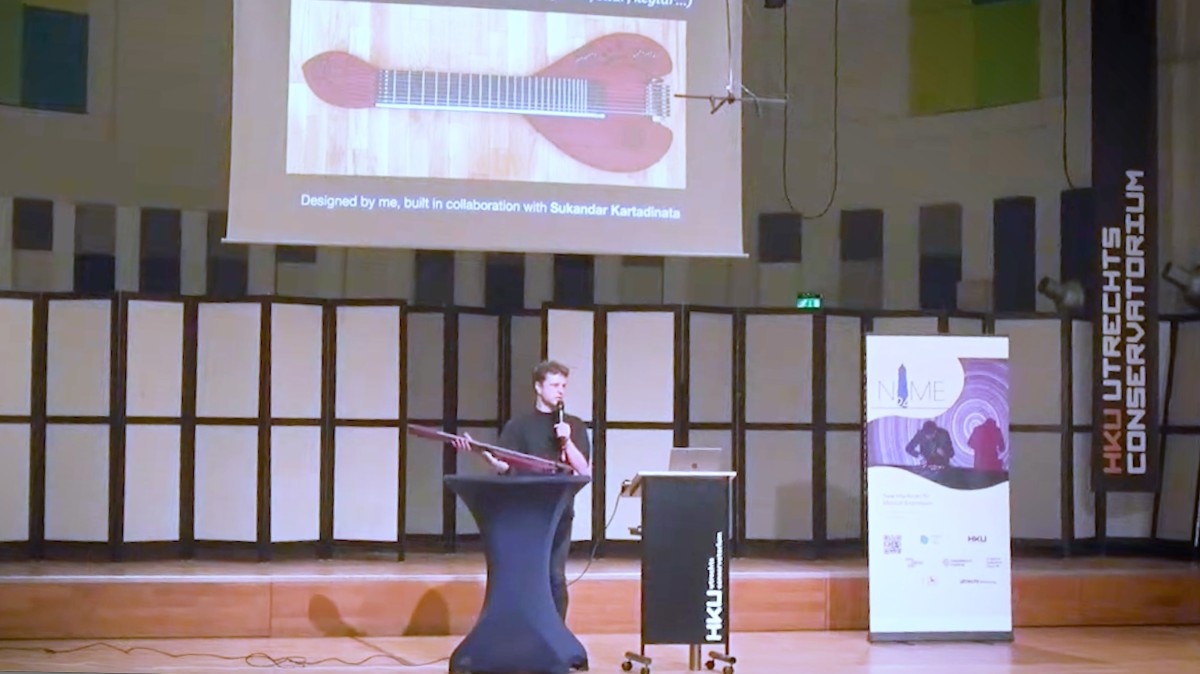Next week is NIME week! This year I am not going – Canberra is way too far from Berlin – but I finally got around uploading my presentation from last year’s conference though, which took place in Utrecht, the Netherlands. Features the Sophtar and a somewhat pretentious digression about magic, ergodynamics, and a quote from a book by Benjamin Labatut I was reading on my way there. Here is the paper!
Tag: Sophtar
-
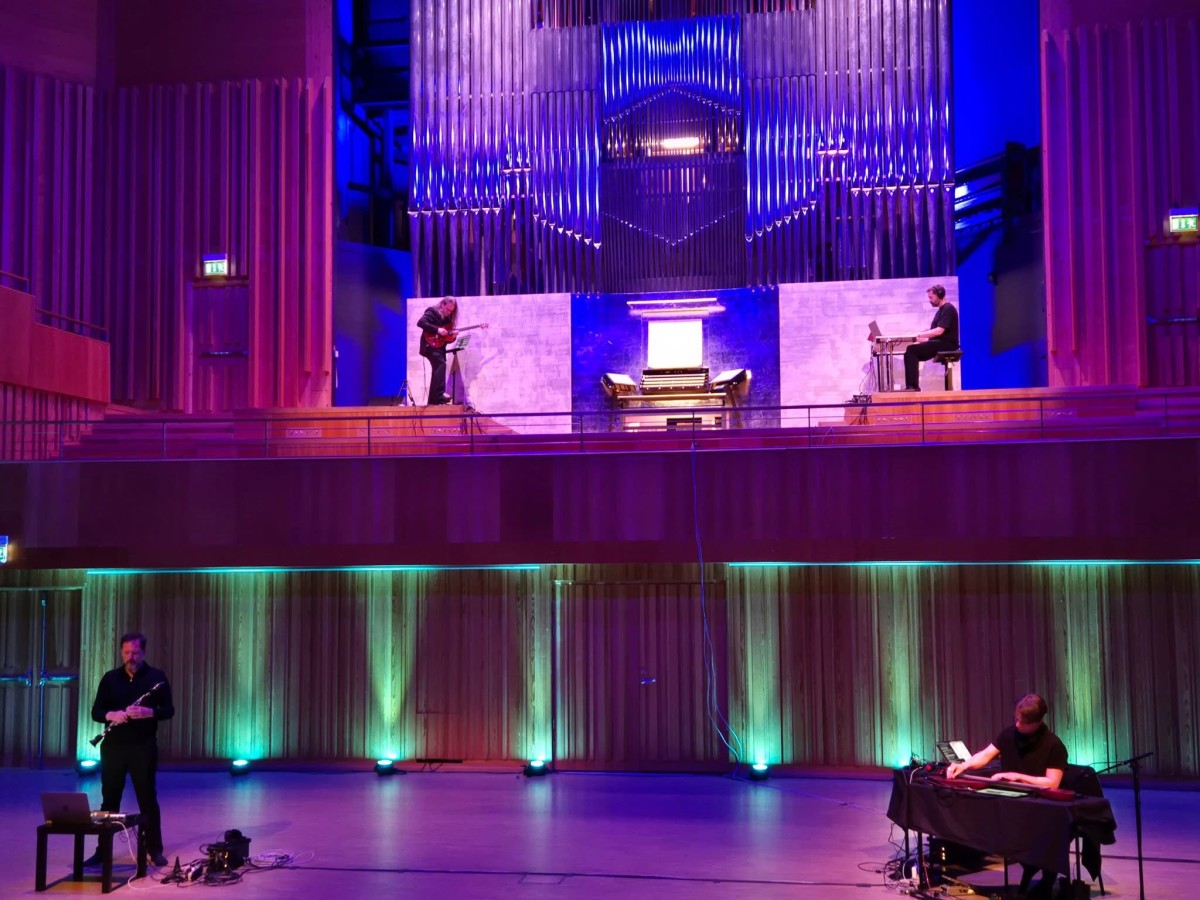
TCP/Indeterminate Place quartet performs Reconciliation at Studio Acusticum
On Monday 9 June 2025 the TCP/Indeterminate Place quartet performed Reconciliation, a piece we composed in 2024 for a special double duo telematic performance in which two of us performed at the Kapelle der Versöhnung in Berlin and the other two at the Orgelpark in Amsterdam. This time we were all at the Studio Acusticum main concert hall, playing our instruments and interacting with the massive Acusticum/University pipe organ in several ways. I experimented with the pressure aftertouch of the Sophtar as a way of adding and subtracting stops to the registration of the IV manual of the organ. Here is short snippet I recorded with my phone during sound check.
TCP/Indeterminate Place is:
Mattias Petersson: parsimonia, live coding, hyperorgan
Stefan Östersjö: midi electric guitar, hyperorgan
Robert Ek: augmented clarinet, hyperorgan
Federico Visi: sophtar, hyperorganOur performance was a prelude Mattias Petersson’s successful PhD defence titled “The Act of Patching” that took place the following day.








-
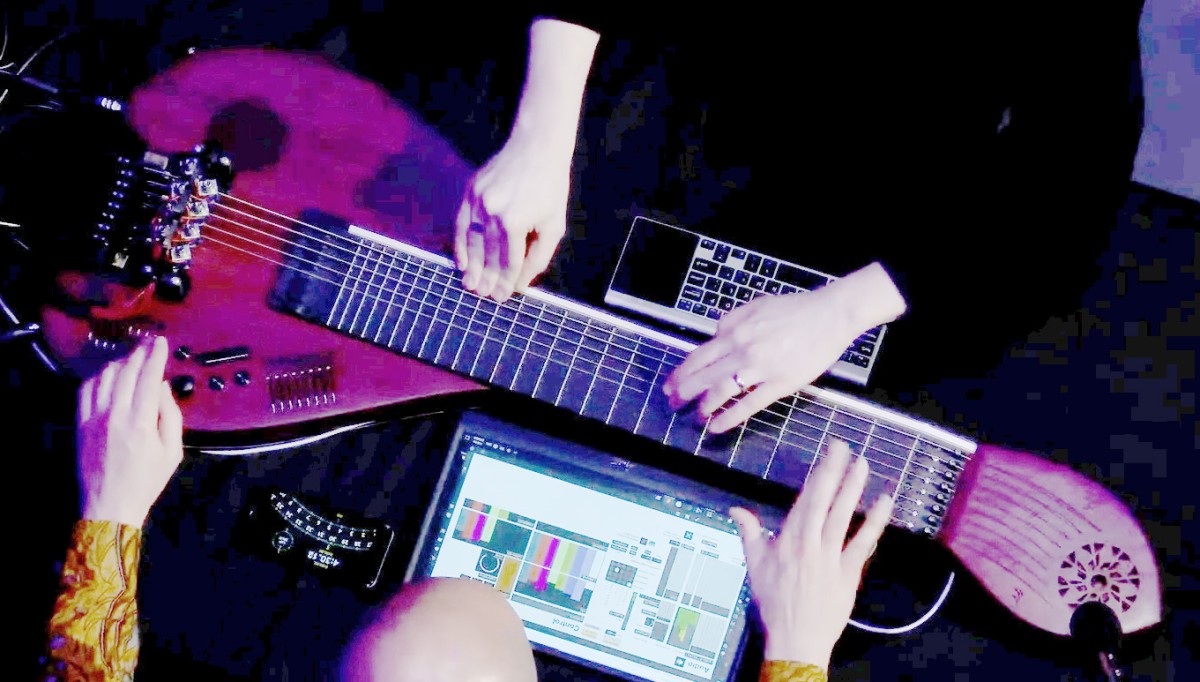
Sophtar live at the 2025 Guthman Musical Instrument Competition
Video of the performance at the 2025 Guthman Musical Instrument Competition, Georgia Tech Ferst Center For The Arts, 8 March 2025.
Jeff Albert: trombone;
Sukandar Kartadinata & Federico Visi: Sophtar -
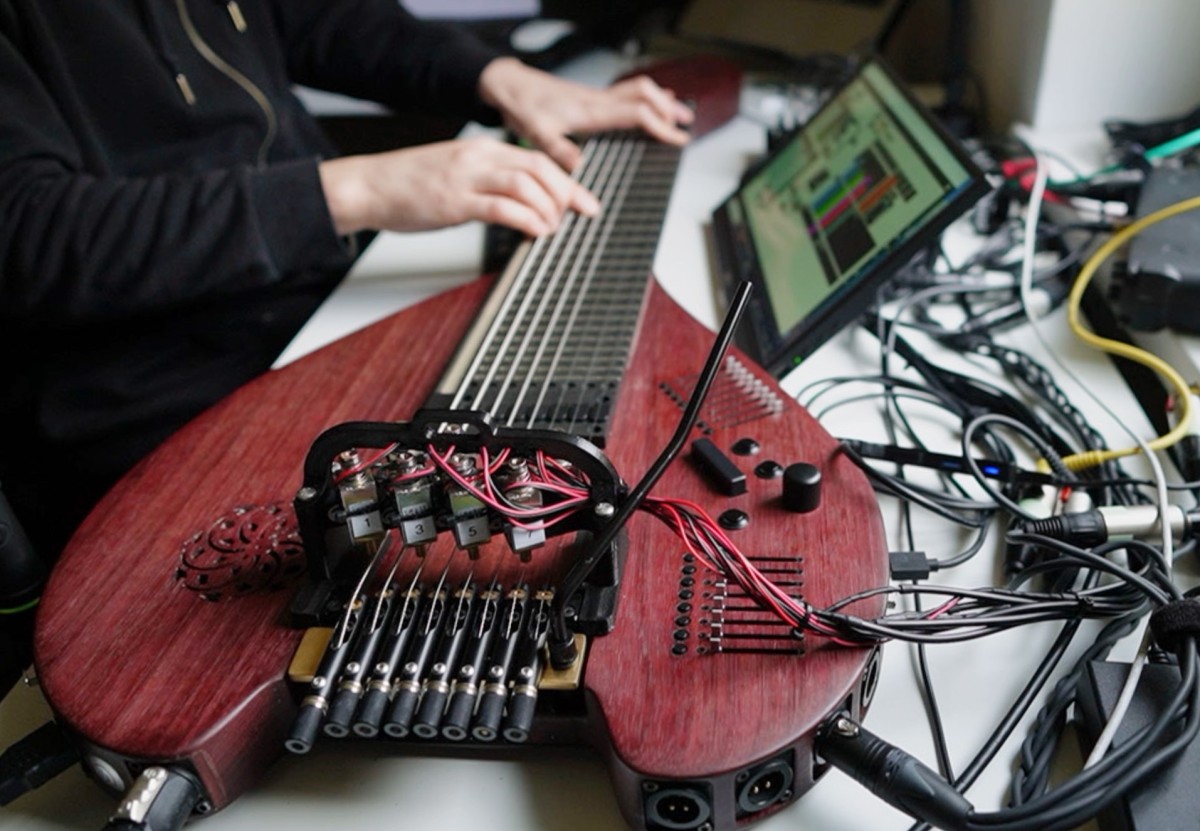
The Sophtar at the Guthman Musical Instrument Competition
The Sophtar has been selected as one the ten finalists in this year’s Guthman Musical Instrument Competition.
Together with Sukandar Kartadinata, we will bring the instrument to the Georgia Tech campus in Atlanta (US) to present it to the competition’s judges and participate in a public performance involving local Atlanta musicians.
I designed the Sophtar and built it in collaboration with Kartadinata. At the Intelligent Instruments Lab, the Sophtar was extended with actuators, on-board DSP, and machine learning models to make it respond to the player in ways that are not easy to predict yet meaningful and inspiring.
Read more about the Sophtar here and check out all the finalists in this year’s compeition here.
The Sophtar has been developed with the support of the GEMM))) research cluster at Luleå University of Technology, the Intelligent Instruments Lab at University of Iceland, the European Research Council, the Swedish Research Council, the Boström Fund, and the Helge Ax:son Johnsons foundation.
-

Wilding AI Lab, CTM 2025
Next week I will take part in the Wilding AI Lab:
this four-day lab will assemble a group of participants selected via open call to learn about the application of generative AI in spatial audio, and collectively explore the wilder territories of AI. Shaped as a mix of theoretical and hands-on components, the lab runs 23 – 25 January, and culminates with a public presentation session Sunday 26 January.
The lab will take place at MONOM, a unique performance venue and spatial audio studio housed at Funkhaus Berlin. It consists in a 3D array of omnidirectional speakers arranged on columns and subwoofers placed underneath the audience, beneath an acoustically transparent floor.

MONOM (Ph: Becca Crawford, from 4dsound.net.) I am pretty excited about experimenting with the Sophtar there, particularly given that each of its eight strings and the audio synthesis machine learning models can be routed to separate output channels, making it possible to place each sound source in a different point in space.

The Sophtar (Ph: Federico Visi). I look forward to meeting the other participants in person. Engaging with a community of practitioners, share skills and ideas, and take part in an open critical discussion on AI- and data-driven tools is crucial to address the rapid changes affecting our cultural landscape. I believe it is also very important to open the process to the public in order to demystify the black boxes, promote critical thinking, spread knowledge, and offer new narratives, so I am excited at the prospect of an open lab on the fourth day. As in Maurice Jones’ words during our first collective Zoom meeting “the design of how we gather is essential.”
Participants
- Daniel Limaverde
- Evangeline Y Brooks
- Federico Visi
- Gadi Sassoon
- Hyeji Nam
- Irini Kalaitzidi
- Nico Daleman
- Ninon and Jun Suzuki
- SENAIDA
- Three Amps
- Transient Cat
- TWEE
Hosts
-
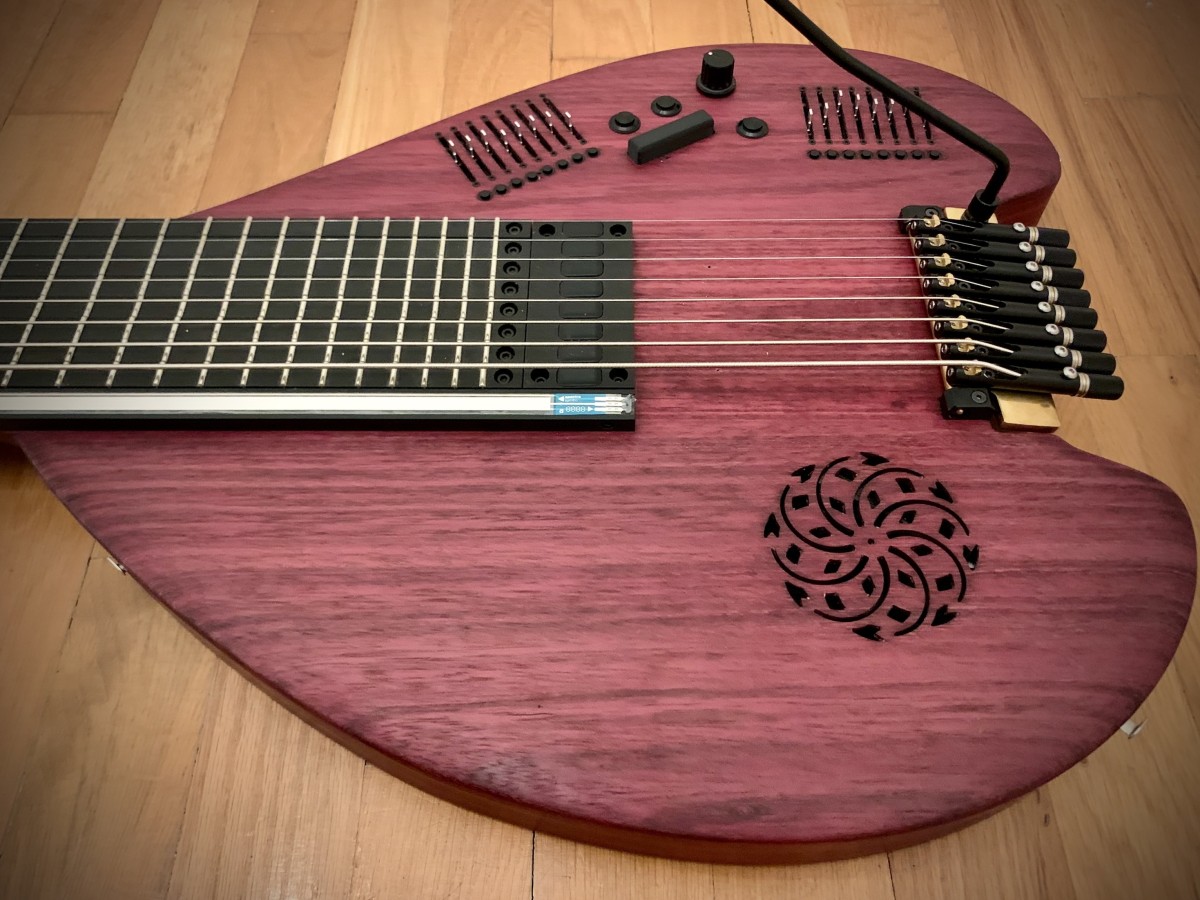
The Sophtar
The Sophtar is a tabletop string instrument with an embedded system for digital signal processing, networking, and machine learning. It features a pressure-sensitive fretted neck, two sound boxes, and controlled feedback capabilities by means of bespoke interface elements. The design of the instrument is informed by my practice with hyperorgan interaction in networked music performance.
I built the Sophtar in collaboration with Sukandar Kartadinata. I presented and performed with it at NIME 2024, here is the paper from the conference proceedings.
At IIL I am working on extending the Sophtar with actuators and machine learning models to make it respond to my playing in ways that are not easy to predict yet meaningful and inspiring. In particular, I am working on:
- an extension that allows the instrument to self-play by means of solenoids,
- embedding notochord models,
- per-string filtering for harmonic feedback.
I see the research and development work on the Sophtar as a way to probe and engage with broader research questions on musical improvisation and co-creativity with machines and algorithms.
I will present the Sophtar at an Open Lab on Friday, 27th September, 15:00-17:00.

Playing the Sophtar at LNDW 2024 Photo: Christian Kielmann. EDIT: here is a video of the performance at the 2025 Guthman Musical Instrument Competition, Georgia Tech Ferst Center For The Arts, 8 March 2025.
Jeff Albert: trombone;
Sukandar Kartadinata & Federico Visi: SophtarThe Sophtar has been developed with the support of the GEMM))) research cluster at Luleå University of Technology, the Intelligent Instruments Lab at University of Iceland, the European Research Council, the Swedish Research Council, the Boström Fund, and the Helge Ax:son Johnsons foundation.
-

Intelligent Instruments Lab, Iceland
My family and I temporarily left Berlin and relocated to Reykjavik, where I am going to join the Intelligent Instrument Lab (IIL) at the University of Iceland. There, I am going to work on extending the capabilities of the Sophtar, the musical instrument I designed to address the needs stemming from my artistic practice involving hyperorgans, networked music performance, and interactive machine learning. I built the Sophtar in collaboration with Sukandar Kartadinata and I describe it more in detail in this NIME 2024 paper. I very much look forward to working with Thor Magnusson and the other super talented researchers at IIL, starting in just a few days!
